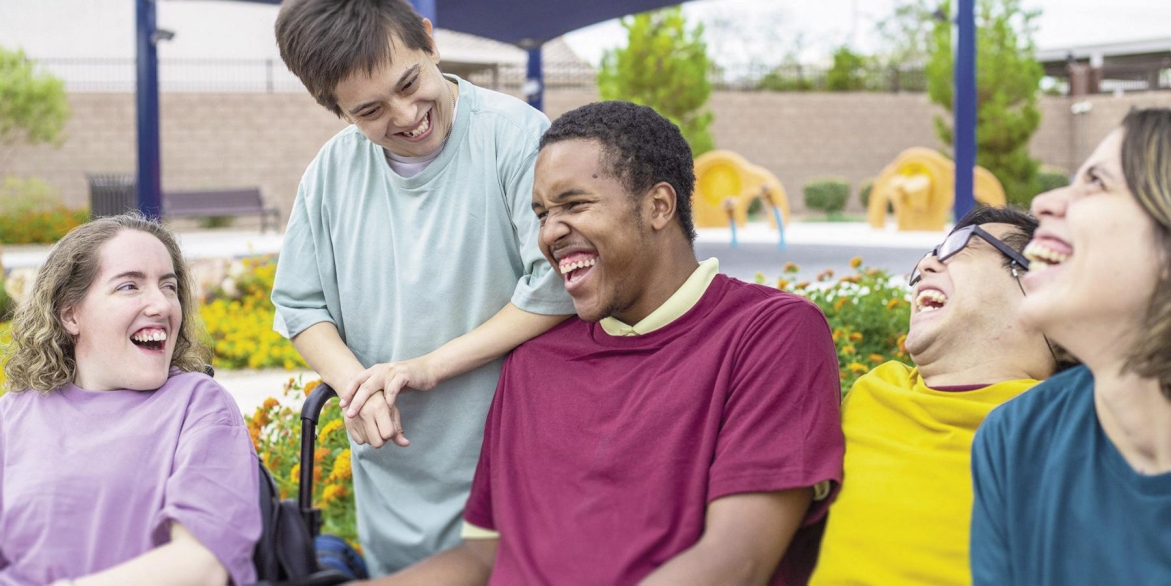
SOCIAL SCENE: Some residential models are progressive, bringing together a mix of neurodiverse and neurotypical residents, allowing for a diversity of interactions that are beneficial to society and bring awareness to the social and emotional capacity of people with disabilities.
and better supports I/DD adults as they continue to develop practical life, social and vocational skills. This is the affordable and future-forward housing solution that parents have been waiting for.
Finding person-centered communities around the country is starting to get a little easier, thanks to government grants, funding programs and public-private partnerships that make a portion of newly built housing units financially accessible to I/DD residents.
Two states, South Carolina and Arizona, are at the forefront of the modern I/DD housing movement. Oak Tree Farm in Conway, S.C., employs on-site staff members to do daily check-ins, and organize group activities and social events. The rent is approximately $500 per month, and the community assists residents with filing for a housing voucher, which can cover up to 70% of the costs.
There's also First Place, a 63-apartment complex in Phoenix for I/DD adults who are transitioning to a more independent life. First Place has tons of activities for its residents, and even has a training kitchen with hands-on cooking lessons that impart valuable skills and bring the community together.
TECHNOLOGY OFFERS A NEW LIFELINE
To be sure, a modern housing ecosystem wouldn't be complete without technology to go along with it. Adults with I/DD are benefiting from a crop of affordable technology tools and apps that let them experience supported independence in the communities where they live. These apps can be tailored to their needs, supplement or eventually replace caregivers, and give lifelines to residents, like social outlets and job opportunities.
One example is NFlyte, an app for residents, case managers and parents that helps adults with autism and I/DD gain practical life skills, such as: task management, meal preparation, maintaining an organized living space, personal hygiene, grocery shopping and budgeting. NFlyte supplements support services for person-centered homes, reduces cost per care for residents and increases the viability of young adults being able to move out of their homes.
SimplyHome is another solution that partners with I/DD home communities to create greater independence and confidence.
SimplyHome can outfit a home for a resident with limited mobility to make it easier to operate lights and locks. The company can equip homes with beds, stoves, and motion sensors in addition to panic pendants to alert a caretaker in case of an emergency.
Hiki is a friendship and dating mobile app for the autistic community. It provides a protected space where neurodiversity is embraced, and being atypical is celebrated, while keeping residents safe from exploitation. Every part of Hiki, from ideation to design to launch, has been built by autistic adults to ensure that it is representative of neurodivergent needs.
Mentra is a job placement platform that has innovated a neurodivergent-friendly application process, that puts candidates in front of inclusive recruiters, rather than forcing applicants to navigate through the challenging process of finding a job with a disability.
Person-centered communities that embrace the social aspect of housing and the associated wrap-around technologies, are the keys to unlocking supported independence for adults with autism and I/DD. When we as primary caregivers are no longer able to be there, it's comforting to know that our child has a chance to live a purposeful and independent life, where they can enjoy some of the rights of passage celebrated in our culture, from cooking their own meals, to getting a job, to being in a stable relationship. It is only then that we as parents can rest easy, and the answer to the everlooming question then becomes: "They'll be at home."•
References
- The Autism Institute's Life Course Outcomes Program, A.J. Drexel Autism Institute at Drexel University
- The Council on Quality and Leadership and The Arc of the United States, There's No Place Like Home: A National Housing Study
- Grantmakers in Aging, Older Care Givers of People with Intellectual and Developmental Disabilities
ABOUT THE AUTHOR:
Stacey Ledbetter is the mother of an autistic young adult, and founder and CEO of NFlyte. Motivated to find tools to empower her daughter to live her most independent life, Stacey built NFlyte as an all-in-one practical life skills platform for autistic adults with support needs. She serves as a committee member at SOS Care/Village Vision in Charleston, S.C., whose mission is to create affordable housing for I/DD adults.